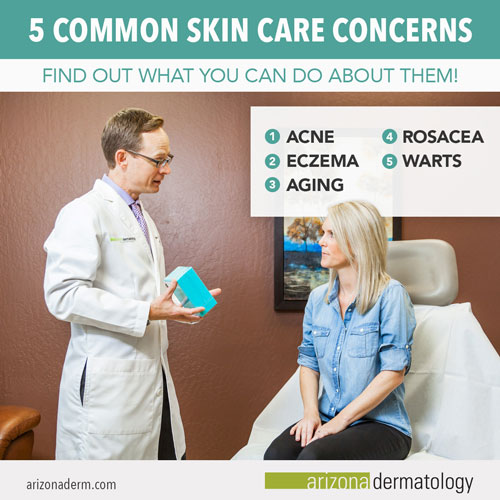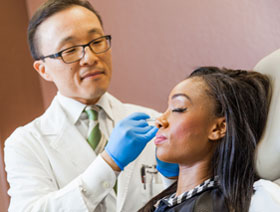
No matter how well you take care of your skin, some skin conditions are simply out of your control. Factors such as genetics and allergies play a large role in causing some of the most frustrating skin disorders. The good news is, not only do our skin care specialists understand your frustration, but we also offer customizable treatment options that will keep your skin issues under control.
The truth is, there’s no faster way to get a proper diagnosis and treatment than coming in for a consultation. But for those wanting immediate answers, we’ve identified five of the most common skin care concerns in this article.
The five most common skin care concerns are:
While some skin conditions are considered more severe than others, many can be hard to maintain and can affect your daily life. Learning about the different treatment options can provide you with major relief.
Acne: How can I get rid of it?
We commonly think of acne as the bane of our teenage years, but the reality is that pimples can also affect adults of any age. Some adults grow out of it, while others will battle with pimples for most of their lives.
There are many forms of acne, from blackheads to whiteheads and painful cysts, but they’re all caused by the same thing: clogged pores. Clogged pores are caused by your skin producing extra oil in an attempt to stop the buildup of bacteria. Improper skin care, poor diet, and hereditary factors can also contribute to the appearance of pimples.
Acne Treatments
If drugstore cleansers and creams aren’t getting you the results you want, you may need a medical solution.
There are a variety of treatment options based on the severity of your acne, such as:
- Medical grade facial cleansers: remove oil, makeup, and debris from your face.
- Prescription medications: fight acne internally by reducing bacteria and fighting inflammation.
- Extraction: cleanses the skin on the face using a form of surgery.
- Corticosteroid injections: flatten painful breakouts that appear large and swollen quickly.
- Additional acne treatments.
Eczema and Dermatitis: Can it be cured?
Got an itch you can’t scratch? Or dry skin that won’t heal? You could have eczema or dermatitis.
Eczema and dermatitis usually take the form of itchy, swollen, crusty, or flaky patches that may leak pus or blood. Excessive scratching damages the skin by causing infections, and it can make the itching sensation even worse. According to the National Eczema Association, eczema is often genetic, but may also be caused by allergic reactions.
There are actually several different types of eczema and dermatitis. A few types include:
- Hand eczema: caused by frequent exposure to irritants, such as chemicals or cleaning agents.
- Irritant contact dermatitis: caused by exposure to irritating or drying compounds such as harsh soaps or solvents.
- Nummular dermatitis: occurs after an injury to the skin, such as an insect bite.
Only a licensed dermatologist can correctly diagnose which type you have and offer the best options for treatment.
Treatments for eczema and dermatitis
There’s no cure for eczema and dermatitis. But with lifestyle changes and the proper treatment, the symptoms can be reduced and controlled.
Speak with your dermatologist about which treatment is right for your specific type of eczema or dermatitis:
- Corticosteroid creams or ointments: relieve dry flaky skin and extreme itching.
- Antibiotics: treat bacterial infections caused by frequent scratching.
- Oral antihistamines: promote sleep to reduce itching.
- Oral or injected corticosteroids: reduces inflammation and severe itching sensation.
- Additional eczema and dermatitis treatments.
Aging: How can I fight the signs of aging?
Although not a skin disorder, aging skin is a huge concern for many people.
Wrinkles, crow’s feet, sagging skin, dark spots—everyone must deal with the signs of aging eventually. Drugstore creams and serums may not be potent enough to help you turn back the clock on your skin. Fortunately, dermatologists don’t just treat medical skin concerns, but cosmetic issues as well.
How to combat the signs of aging
Of course, it is impossible to stop the aging process. But it is possible to age beautifully with both surgical and non-surgical solutions.
Cosmetic Services for aging skin
Medspa Services for aging skin
Rosacea: Is there a cure?
Rosacea is commonly mistaken for acne because it causes similar red bumps to form in the center of the face. Rosacea begins as a tendency to blush easily, but over time the redness becomes permanent. In its advanced stages, skin affected by rosacea is so sensitive that it’s even irritated by water. This makes having rosacea not only uncomfortable, but it can also lead to low self-esteem.
Treatments for rosacea
Unfortunately, rosacea can’t be cured, but there are a number of treatment options available at Arizona Dermatology.
- Prescription medications: reduce inflammation and redness.
- Vascular laser treatments: reduce redness by closing blood vessels.
- Rhinophyma: diminishes swelling of the nose.
- Additional rosacea treatments.
Warts: How can I get rid of them?
Before we can provide a treatment option for warts, we first have to identify which type of wart a patient has.
Four of the most common types of warts include:
- Common warts: appear on the fingers and toes.
- Plantar warts: grow on the soles of the feet.
- Genital warts: grow on the anal or genital areas and are caused by sexual contact.
- Molluscum: appear anywhere on the body and are caused by the molluscum contagiousum virus.
Warts are an infection caused by human papillomaviruses (HPV), which you’re likely to get if your skin is cut or damaged. Each of the 130 known types of HPV usually target a few areas of the body, which is why warts commonly appear on areas such as your hands and feet. Warts may appear if your skin is damaged or if a wart comes in contact with an open wound.
Warts are generally harmless and painless, however they are contagious—and honestly, they’re not very attractive. Fortunately, they can be treated.
At Arizona Dermatology, we can help you determine which type of wart you have and the best way to treat it. Our physicians will recommend the best solution for the type of wart based on how severe it is. Most applications are painless and do not require surgery, minimizing any chances of scarring.
How to get rid of warts
You might find some home remedies for wart removal online, but nothing is more reassuring than having a skin care specialist remove your wart using the proper treatment method.
We use a variety of treatment options to remove different types of warts, such as:
- Cantharidin: a liquid blistering agent that reduces pain and scarring.
- Podophyllin: a painless treatment for removing warts in sensitive areas.
- Cryotherapy: a treatment using liquid nitrogen to “freeze” off the wart.
- Additional wart treatments.
Conclusion
Aging, acne, eczema, warts, and rosacea can affect the look and feel of your skin—and your overall lifestyle! But with the help of a dermatologist, each of these common skin concerns can be managed. Only a dermatologist can properly diagnose your skin condition and offer the best treatment for your specific issue.
Contact Arizona Dermatology by finding your nearest location, and start clearing up your skin concerns today!


